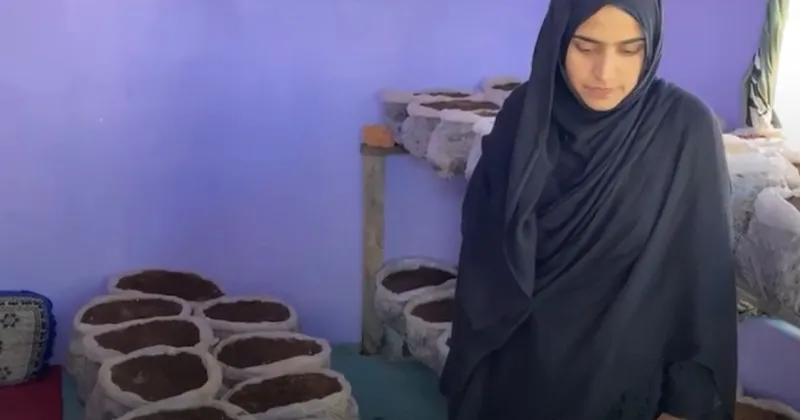Meet Nilofar Jaan, whose home-grown mushroom business earns her Rs 90K per year
Pulwama resident Nilofar Jaan received training in mushroom cultivation from the Department of Agriculture, Kashmir, and claims to earn around Rs 90,000-1 lakh per year.
Nilofar Jaan, a young girl from Gangoo village in south Kashmir’s Pulwama district, is growing organic mushrooms to earn a livelihood for her family.
From her home-based business, Nilofar claims she earns around Rs 90,000-1 lakh per year.
A few years before, she had received training in mushroom cultivation from the Department of Agriculture, Kashmir, and subsequently established her own business venture.
Nilofar says, “The agriculture department provided me with a subsidy to start the mushroom unit at my home and also imparted the training. The department has made all possible efforts to make my unit successful.”
Inside her residence in Gangoo, some three kilometres from Pulwama's main town, Nilofar smiles and says, girls who are searching for jobs from pillar to post should take up mushroom cultivation to start their own business venture. Adding, “Mushroom cultivation can be done easily at home with limited space, and the mushrooms have a tremendous market in Kashmir.”

Encouraged by the agricultural department to go for a mushroom cultivation unit, 22-year-old Nilofar was offered the bags for Rs 50,000. “I took the initiative and started with mushroom cultivation in a room," she adds.
Nilofar claims to have harvested a good amount of mushrooms locally known as ‘Heddar’ in her very first attempt. “After getting success and accomplishments of the first cultivation, I approached the agriculture department for more bags,” she continues.
Besides her business, young Nilofar is also pursuing Masters in Social Work from Indira Gandhi National Open University (IGNOU). “I not only earn a livelihood for my family, but I also spend my earnings on my studies. I aim to become an educated businesswoman,” says the young girl with a smile.
Nilofar recalls the time when she could not even afford to pay her semester fees, but today, she makes a good living, thanks to the mushroom business.
When asked how she is cultivating mushrooms, Nilofar explains that after sowing mushroom seeds, the crop gets ready in a few weeks. Once the crop is ready, the mushrooms are placed in small boxes with proper packaging. The packed organic mushroom boxes are sold in vegetable markets between Rs 25 and 50.
Mushrooms have become a famous vegetable in Kashmir, and over the years, Mushroom Yakhni, a delicious curry cooked with yoghurt and spices, has been introduced in Kashmiri multi-cuisine, Wazwan.
Nilofar intends to expand from one unit to multiple units in the coming months. “The success behind mushroom cultivation has encouraged me to continue this venture. I expect more girls to receive training from the agriculture department to start this profitable farming venture,” she suggests.
The political disturbance in the Kashmir Valley, followed by regular lockdowns and the COVID-19 pandemic, did not affect the sale of her home-grown mushrooms in the market.
Nilofar says, “Lockdowns helped me to remain more engaged with mushroom farming. I have been working with utmost dedication, and I spend hours every day to yield quality crops.”
Over the years, mushrooms have created a substantial profit for Kashmiri women, who have not had much financial freedom but are now able to contribute to their families.
According to government figures, the women work participation rate is less than 50 percent in the Jammu and Kashmir union territory.
Edited by Suman Singh



![[Startup Bharat] From foodtech to ecommerce, these five startups from Kashmir are fostering innovation](https://images.yourstory.com/cs/2/ba9e8080834311ec9e7e95cb06cf6856/kashmir-1644926042551.png?fm=png&auto=format&h=100&w=100&crop=entropy&fit=crop)
![[Startup Bharat] From handwoven pashmina to carpets, this Srinagar-based D2C startup aims to promote Kashmir’s handloom globally](https://images.yourstory.com/cs/2/b87effd06a6611e9ad333f8a4777438f/ATK1-1643793527662.png?fm=png&auto=format&h=100&w=100&crop=entropy&fit=crop)




